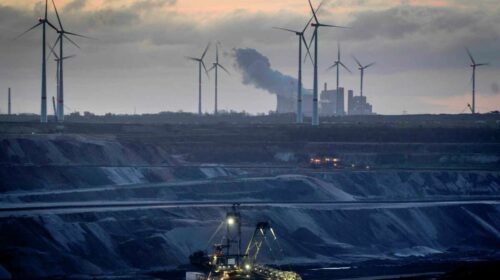US President Joe Biden and Indonesian President Joko Widodo will announce a climate finance deal providing $20 billion to help Indonesia pivot away from coal power.
The funding deal, brokered between the US, Indonesia and Japan, is set to be outlined Tuesday on the sidelines of the Group of 20 summit in Bali, following more than a year of talks. It is the largest single climate finance transaction ever, according to a senior US Treasury Department official.
Under the package, Indonesia will commit to capping carbon dioxide releases from its electricity sector at 290 megatons by 2030 — an emissions peak that will apply not just to its conventional grid but also power suppliers for industrial facilities. The country will also establish a goal of reaching net-zero emissions in the power sector by 2050 and commit to boost deployment of renewable energy so that it comprises at least 34% of all power generation by the end of this decade.
More than 10 gigawatts of localized power systems in Indonesia are set to be redirected to renewables instead of coal, according to a State Department official who requested anonymity to preview the announcement. Some of the funding could go toward renegotiating debt for existing coal plants, with the goal of retiring them early.
The effort “can truly transform Indonesia’s power sector from coal to renewables and support significant economic growth,” US Special Presidential Envoy for Cimate John Kerry said. “At every step, Indonesia has communicated the importance of building a clean economy that works for the people of Indonesia and attracts investment. Together, we have a shared vision for that goal.”
$600 Billion Need
The financing commitment – known as a “just energy transition partnership,” or JETP – chips away at the estimated $600 billion that Southeast Asia’s largest economy will need to phase out coal-based electricity in favor of a grid powered by renewables with the capacity to connect the next generation of electric vehicles.
Indonesia has said solar, geothermal and nuclear energy will be crucial to its goal of reaching net-zero carbon emissions by 2060. Under the pact, it is moving up its net-zero goal for the power sector to 2050. Indonesian state power firm Perusahaan Listrik Negara also has set a goal to double the share of renewables in its energy mix by 2025.
Indonesia had previously planned to shut all its coal plants by 2055. Under the arrangement, the country’s emissions will peak in 2030 — seven years earlier and at an amount about 25% less than previously expected, according to the senior Treasury official.
Details of the financial package are to be developed over the next three to six months, with the $20 billion split between government dollars and private finance. The private sector spending will include contributions from the Glasgow Financial Alliance for Net Zero group of banks and asset managers, likely taking the form of debt and equity.
Government funding is likely to include concessional loans, grants and equity, with support coming from the US, Japan, Canada, Denmark, the EU, France, Germany, Italy, Norway and the United Kingdom.
Banks involved in the deal include Bank of America Corp., Citigroup Inc., Deutsche Bank AG, HSBC Holdings Plc, Standard Chartered Plc, Mitsubishi UFJ Financial Group Inc. and Macquarie Group Ltd, according to the senior Treasury official. The money will be delivered within three to five years, the official said.
Wary of Debt
Indonesia has a massive funding need for energy transition and development, but the country also has a low appetite for debt. It maintains a relatively small debt ratio at 42.71% of gross domestic product, the fourth-lowest among G-20 nations.
The Southeast Asian country would only agree to the JETP if the rates offered are as low as those in developed markets, Luhut Panjaitan, coordinating minister for investment and maritime affairs, said at the Bloomberg CEO Forum in Bali on Friday.
“If it’s the same as for emerging markets, then what’s the point for us?” he said.
The program doesn’t allow for financing natural gas projects. Investments that could be backed include boosting solar manufacturing and re-negotiating coal take-or-pay contracts to facilitate plant closures.
Group of Seven countries had aimed to complete the deal -– modeled on a similar, $8.5 billion pact with South Africa announced during last year’s UN climate summit -– by the end of the calendar year. Members of the G-7 have sought similar finance agreements with Vietnam, India, and Senegal, with negotiations intensifying before the climate summit in Egypt this month.
Although it took a year for donor countries and South Africa to work out a final investment plan for that JETP, the Indonesian effort envisions a more rapid turnaround, including the creation of a secretariat and the identification of necessary policy changes over the next three months.





